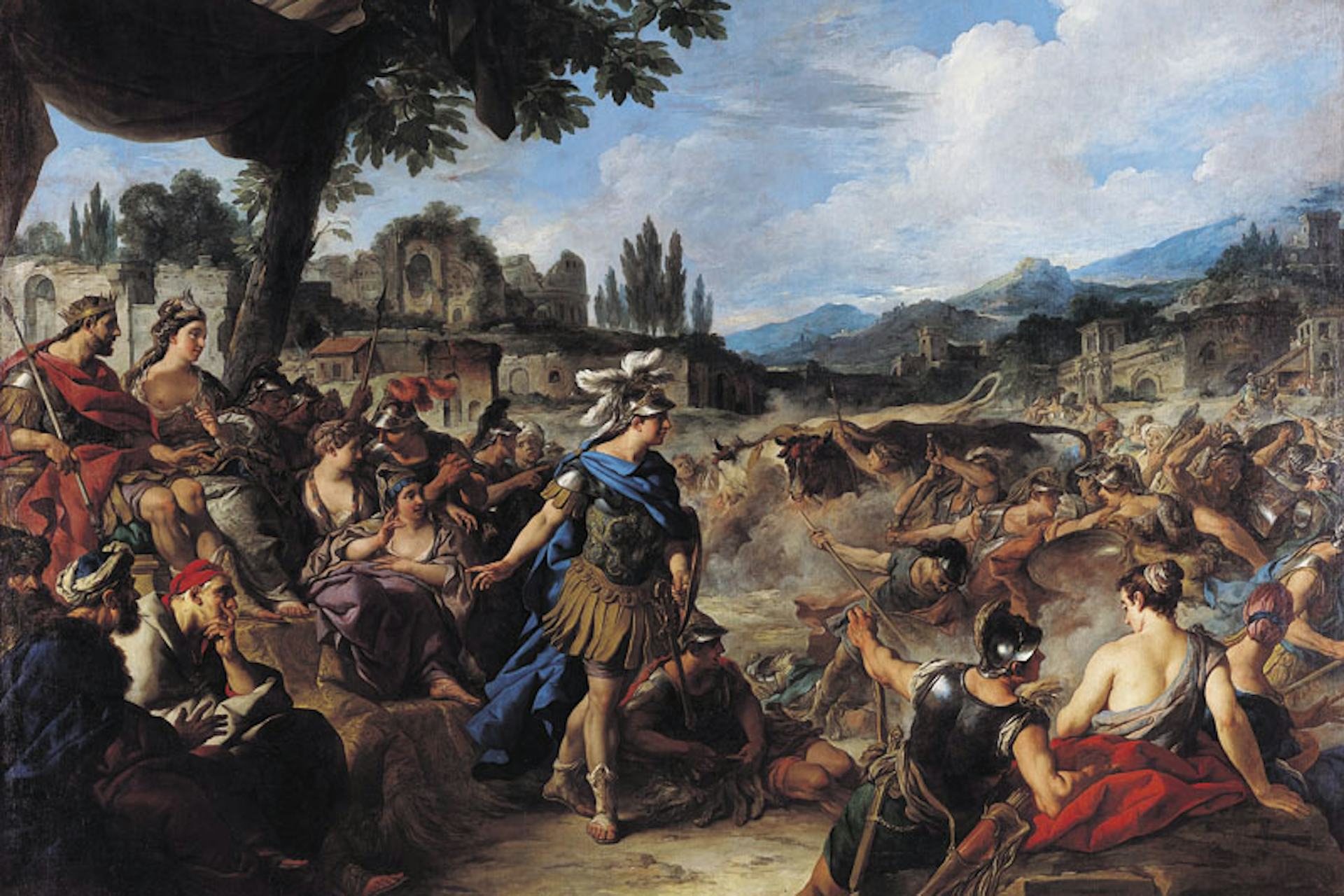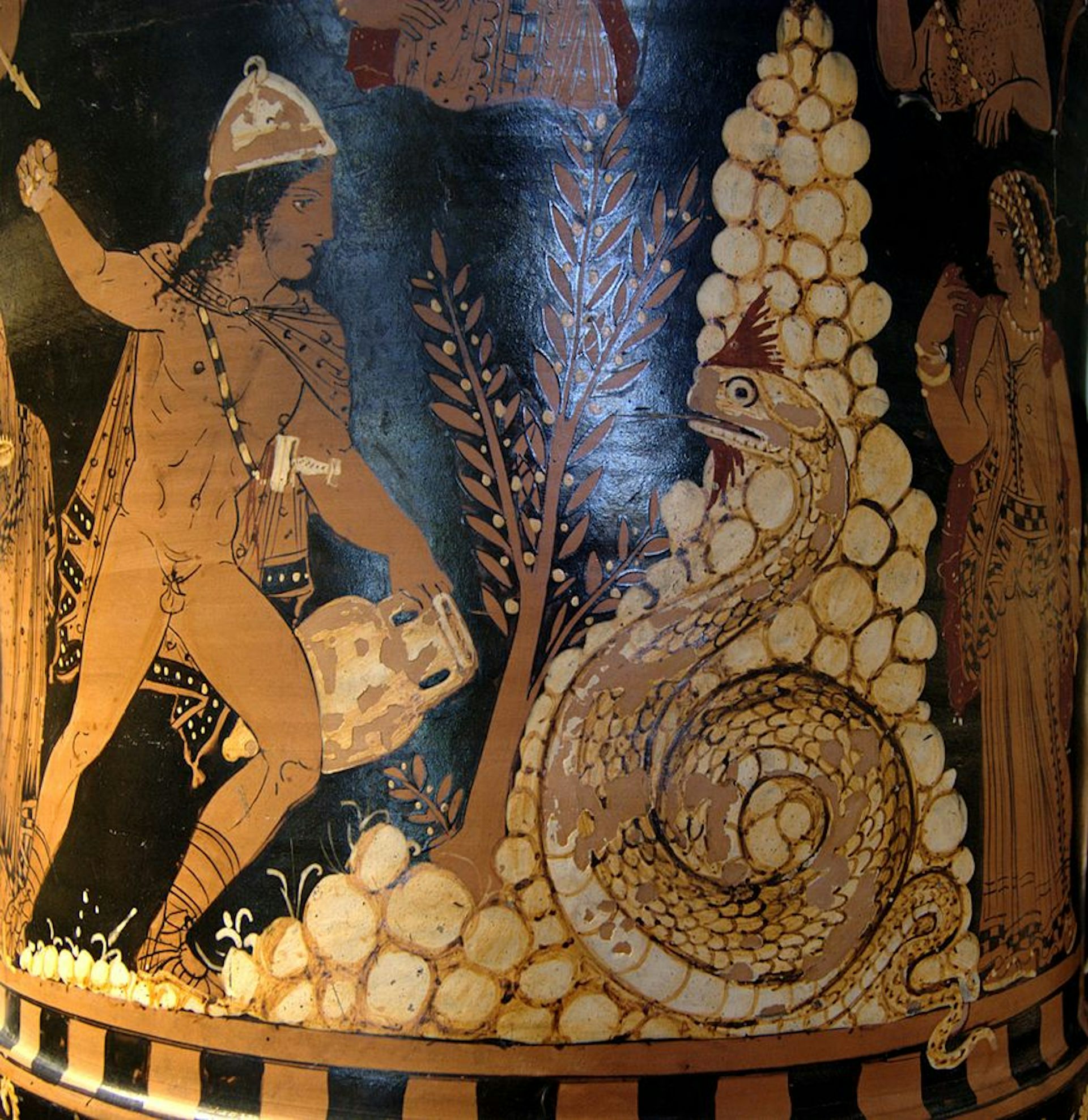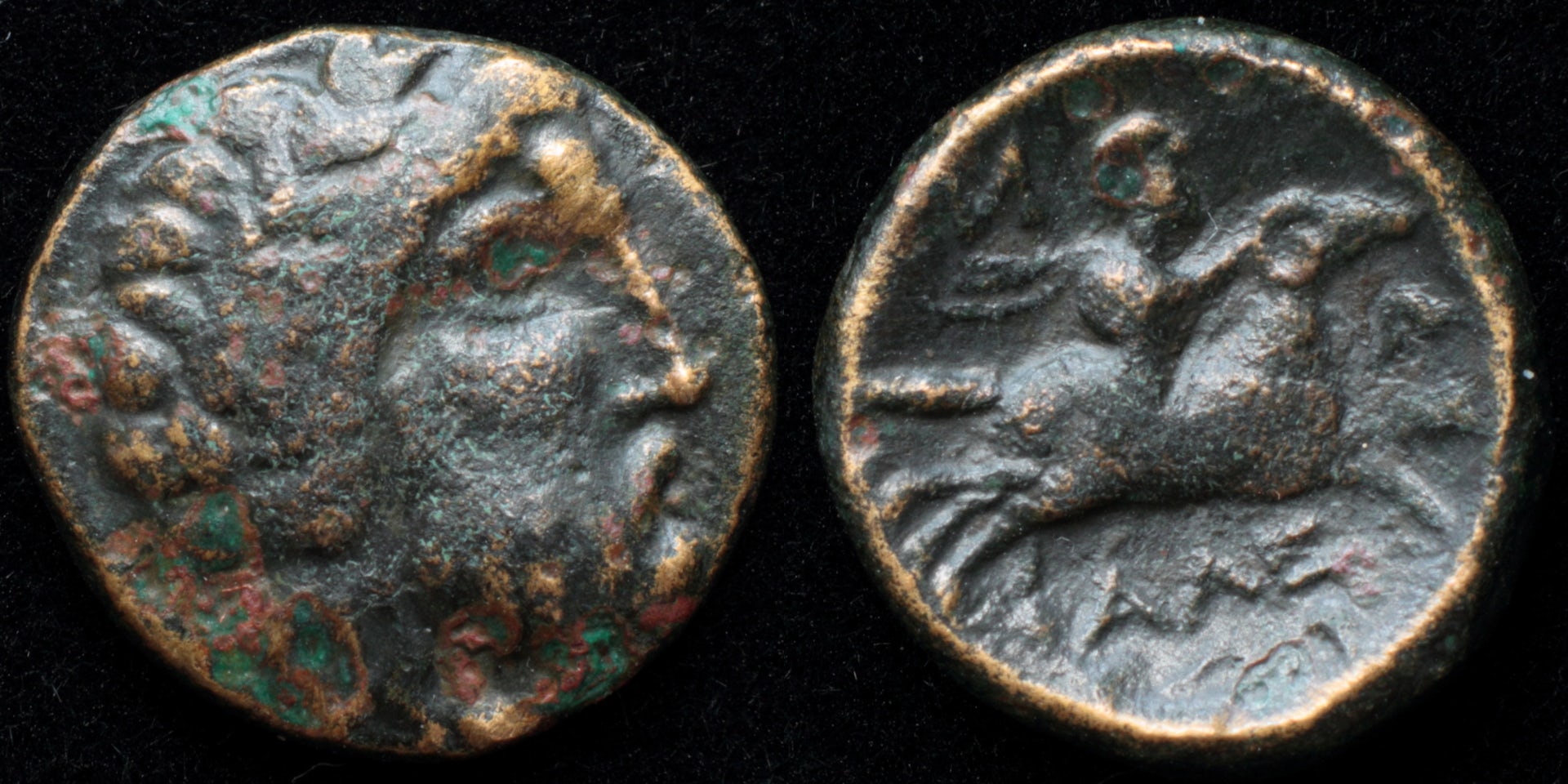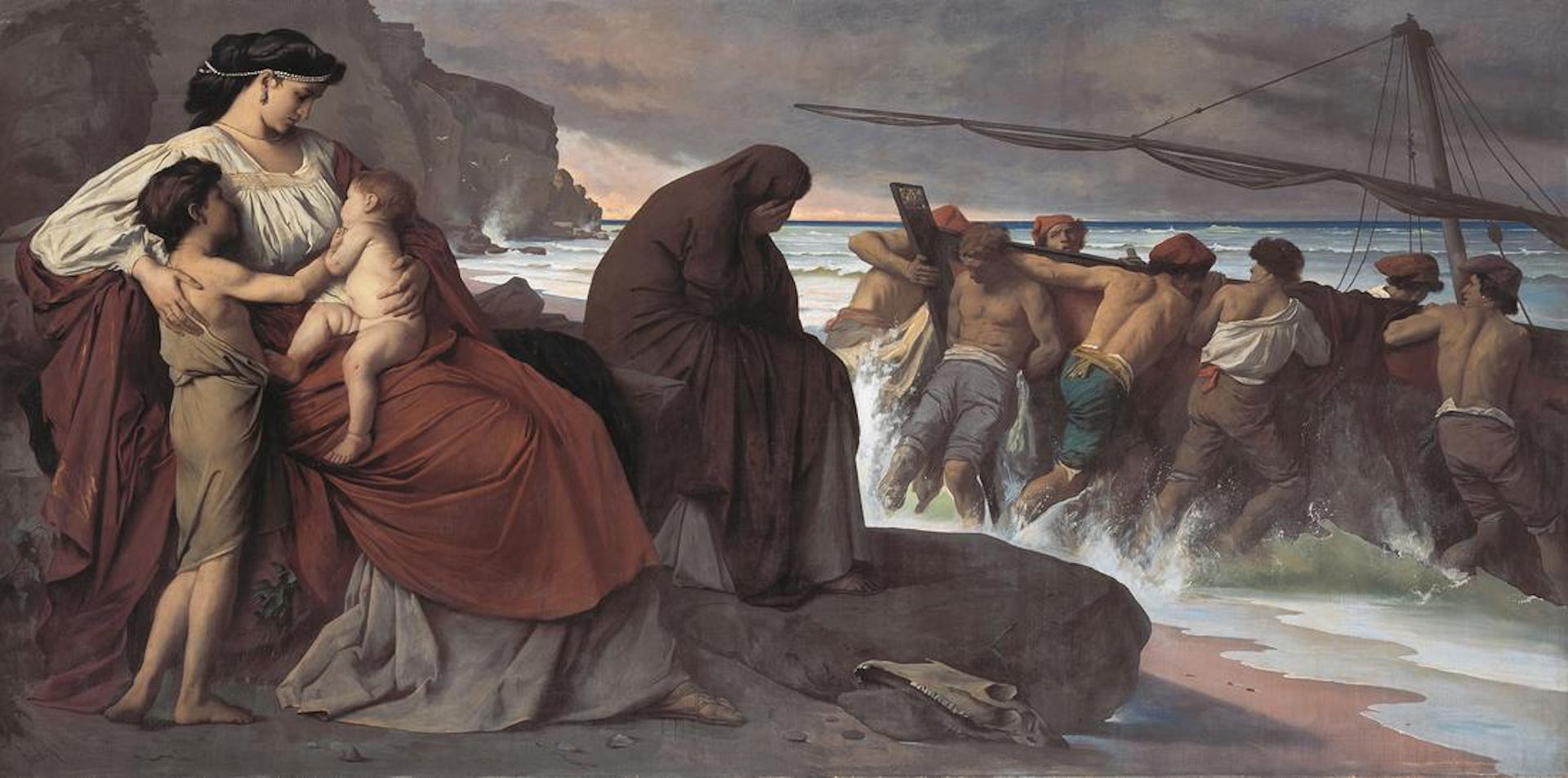Aeetes

The Winning of the Golden Fleece by Jean François de Troy (ca. 1745)
Musée des Augustins, Toulouse / Daniel MartinPublic DomainOverview
Aeetes, child of the sun god Helios, was a brutal king of Colchis. He is best remembered for his role in the myth of Jason and the Argonauts, who sailed across the sea to fetch the Golden Fleece from Aeetes.
Aeetes was unwilling to give up the fleece and tried to get rid of Jason by assigning him a number of impossible tasks. Against all odds, Jason completed these tasks, but Aeetes still refused to part with the fleece. In the end, Jason stole his prize with the help of Aeetes’ daughter, the witch Medea.
Aeetes never managed to reclaim the Golden Fleece, though he did pursue the Argonauts to the edge of the world. In some traditions, he was later overthrown by his brother Perses, but regained his throne with Medea’s help.
Etymology
The name “Aeetes” (Greek Αἰήτης, translit. Aiḗtēs) appears to be etymologically connected with the Greek word αἰετός (aietós), meaning “eagle.”
Pronunciation
English
Greek
Aeetes Αἰήτης (Aiḗtēs) Phonetic
IPA
[ee-EE-teez] /iˈi tiz/
Attributes
Aeetes was typically represented as a cruel king, jealous of his power. Already in the Homeric epics, he was notable for his wickedness.[1]
Aeetes’ kingdom was in Colchis, a region on the eastern coast of the Black Sea. His city, near the Phasis River, was called Aea; one poet claimed it was the place where the rays of the sun were stored.[2]
In one tradition, Aeetes had originally inherited Corinth, a kingdom in central Greece. But he gave up his crown to Bunus, a son of Hermes, and ventured forth to found the new kingdom of Aea.[3]
As a child of the sun god Helios, Aeetes was closer to the gods than most mortals. He boasted many extraordinary possessions that he had received from the gods. These included a breastplate from Ares;[4] a magnificent palace, fashioned for him by Hephaestus;[5] and a pair of enormous fire-breathing bulls, as well as a plow of unbreakable adamant, also gifts from Hephaestus.[6]
Aeetes also owned half the teeth from the dragon slain by Cadmus, a gift from Athena and Ares; when these teeth were sown, fully-grown men emerged from the earth.[7]

Red-figure calyx-krater showing Cadmus fighting the dragon found in Sant'Agata de' Goti (ca. 350–340 BCE)
Louvre Museum / Bibi Saint-PolPublic DomainBut Aeetes’ most famous attribute and possession was the Golden Fleece, taken from the winged golden ram that had brought Phrixus to Colchis, and given to Aeetes by Phrixus himself (see below). This was the much-desired prize that lured Jason and the Argonauts to Colchis.
Aeetes did not appear in ancient Greek art, though he did occasionally feature in Roman and Southern Italian art, where he was typically shown with either Jason or Phrixus.[8]
Family
Ancient sources agreed that Aeetes’ father was the sun god Helios, but they did not always agree on the identity of his mother. In what was probably the standard account, his mother was an Oceanid named Perseis (or Perse).[9] But in other traditions, Aeetes’ mother was identified as the Oceanid Ephyra,[10] as Antiope,[11] or as Asterope.[12]
Aeetes had several siblings. The most important of these were Circe, a skilled sorceress who lived on a remote island;[13] Pasiphae, wife of the Cretan king Minos;[14] and Perses, a rival for Aeetes’ throne.[15] Some authors also included Aloeus[16] and Calypso[17] among Aeetes’ siblings.
Aeetes was said by most sources to have married Idyia,[18] one of the Oceanids (his mother was also an Oceanid, meaning his wife was also his aunt). In one tradition, he was married to a different Oceanid, Asterodia, before partnering with Idyia.[19] Other sources identified Aeetes’ wife as either Eurylyte,[20] Hecate (a mortal witch, not the Underworld goddess),[21] a Nereid named Neaera,[22] Clytie,[23] or Hypsea.[24]
In the standard tradition, Aeetes had three children (not necessarily by the same mother). These included a daughter named Chalciope,[25] whom he married to Phrixus, as well as a son named Apsyrtus.[26] But Aeetes’ most famous child was his daughter Medea, a sorceress who betrayed him by helping the Argonauts steal the Golden Fleece.[27]
According to one author, Aeetes also had a daughter named Circe (with the witch Hecate).[28]
Mythology
The Coming of Phrixus
Aeetes’ mythology was defined by his encounters with uninvited visitors to Colchis. The first of these visitors was Phrixus, a Boeotian prince whose cruel stepmother had plotted against him and his sister Helle.
Phrixus and Helle managed to escape their stepmother on the back of a flying golden ram, sent by their mother Nephele. Unfortunately, Helle fell from the ram as the siblings were crossing the sea, and only Phrixus made it to Colchis.

Thessalian bronze dichalcon with image of Phrixus riding the golden ram on the reverse (third century BCE)
Johny SYSELCC BY-SA 4.0When the fugitive Phrixus arrived in his kingdom, Aeetes received him warmly (in one account, he had been commanded to do so by Zeus).[29] Aeetes even gave Phrixus his daughter Chalciope’s hand in marriage. Phrixus, wishing to show his gratitude, sacrificed the golden ram that had brought him to Colchis and gave its precious fleece—the infamous Golden Fleece—to Aeetes.[30]
The Golden Fleece had magical qualities, and Aeetes’ power was usually said to be deeply entwined with his possession of the fleece. His reign, however, was marred by prophecies of doom, most of which involved the fleece.
According to some sources, Aeetes was warned that he would be destroyed by one of his offspring.[31] According to others, the prophecy said that Aeetes would be killed by strangers who had come to steal the Golden Fleece,[32] or that he would lose his kingdom if he ever lost the fleece.[33] In still other accounts, the prophecy was merely a vague insinuation of impending treachery and disaster.[34]
In one tradition, Aeetes’ paranoia finally turned him against Phrixus. Aeetes learned of a prophecy that he would be killed by a stranger descended from Aeolus; thinking that this prophecy referred to Phrixus (who was indeed a descendent of Aeolus), Aeetes had him killed.[35]
In the standard tradition, however, Aeetes never harmed Phrixus. Rather, Phrixus died peacefully of old age, on good terms with Aeetes till the end. In some accounts, the ghost of Phrixus even appeared to Aeetes in a dream to warn him that he would be ruined if the fleece was stolen.[36]
The Coming of the Argonauts
The next visit from unexpected guests did not end so well for Aeetes. Some time after the death of Phrixus, the hero Jason was ordered by his uncle Pelias to fetch the Golden Fleece. Jason thus assembled a band of warriors—the Argonauts, named after their ship the Argo—and set sail for Aeetes’ remote kingdom of Colchis.
Though they encountered many obstacles on their journey, Jason and the Argonauts at last arrived in Colchis. Jason promptly went to Aeetes’ palace and asked to be given the Golden Fleece. But Aeetes, fearing what would happen to him if he lost the fleece, reacted with anger. He decided to get rid of Jason once and for all by assigning him a series of impossible tasks—tasks that no mortal could ever hope to accomplish.
In the standard tradition, Aeetes gave Jason three tasks: first, he had to yoke Aeetes’ fire-breathing, brazen-hooved bulls; second, he had to plow a field with the bulls; and finally, he had to sow the dragon’s teeth that had been gifted to Aeetes by Athena and Ares.[37] According to the Roman poet Valerius Flaccus, Jason was also tasked with assisting Aeetes in his war against his brother Perses.[38]
But Medea, Aeetes’ daughter, had fallen in love with the handsome Jason and resolved to help him. As a sorceress, Medea was able to assist Jason using magic: she gave him an ointment to protect him from the fiery bulls, as well as instructions on what to do in order to survive the trials imposed by her father. In exchange, Jason promised to take her with him to Greece and make her his wife.

Medea by Anselm Feuerbach (1870)
Neue Pinakothek, MunichPublic DomainWhen the time came, Jason was able to successfully perform all three tasks: he yoked and harnessed the bulls and used them to plow a field, which he then sowed with the dragon’s teeth. Once the teeth had been planted, an army of fully-grown warriors rose from the earth. But thanks to Medea, Jason was ready for them.
Following the instructions Medea had given him, Jason threw a stone into the midst of the sown men. Thinking that one of their own had thrown the stone, the men started fighting amongst themselves. Jason took advantage of this chaos to enter the fight, quickly dispatching the magical warriors.
Aeetes watched with horror, realizing that he had been betrayed. Even though Jason had accomplished his tasks, Aeetes refused to hand over the Golden Fleece—little good that it did him. With Medea’s help, Jason was able to steal the fleece and escape Colchis with the Argonauts.
According to the standard tradition, Jason accomplished this theft by killing (or putting to sleep) the ever-vigilant serpent who kept watch over the fleece.[39] But in another tradition, he and the Argonauts slipped away, fleece and all, while Aeetes was in bed with his wife.[40]
When Aeetes realized that the Argonauts—and his own daughter—had robbed him, he sent Colchian troops to pursue them. But Medea was able to slow the troops down by killing her brother Apsyrtus.
In the more gruesome version of the story, she cut his body into pieces and threw them into the sea so that the Colchians had to stop to collect them.[41] In another version, she and Jason lured Apsyrtus to an island, where they ambushed and killed him and many of his men.[42]
In one obscure tradition, Aeetes himself led the Colchians against the Argonauts, and even fought them in a sea battle. Though there were casualties on both sides, Aeetes was ultimately killed by the Argonaut Meleager, a prince from Calydon, and the Argonauts were able to escape.[43]
In most accounts, however, Aeetes did not pursue the Argonauts himself, instead remaining in Colchis as his men carried out their hunt across the Mediterranean. But the Colchians never captured the Argonauts or Aeetes’ precious Golden Fleece.
Aeetes and Perses
According to some sources, after the theft of the Golden Fleece, Aeetes’ brother Perses usurped his throne. But Medea, who had had a falling out with Jason, came back to Colchis, killed Perses, and restored her father to his throne.[44] In a variant of this tradition, it was Medus, the son of Medea and the Athenian king Aegeus, who killed Perses and restored Aeetes.[45]
Popular Culture
Aeetes has had a longstanding presence in the Western imagination, where he continues to be remembered as the villainous opponent of Jason and the Argonauts. He has appeared in a number of novels retelling the myth of the Argonauts, including Robert Graves’ Hercules, My Shipmate (1944) and Henry Treece’s Jason (1961).
In films, such as the popular fantasy adventure film Jason and the Argonauts (1963), Aeetes is depicted in much the same way the ancient Greeks imagined Asian tyrants: as a cruel, bloodthirsty ruler, sporting the characteristic regalia of the ancient Phrygians (including the notorious “Phrygian cap”).